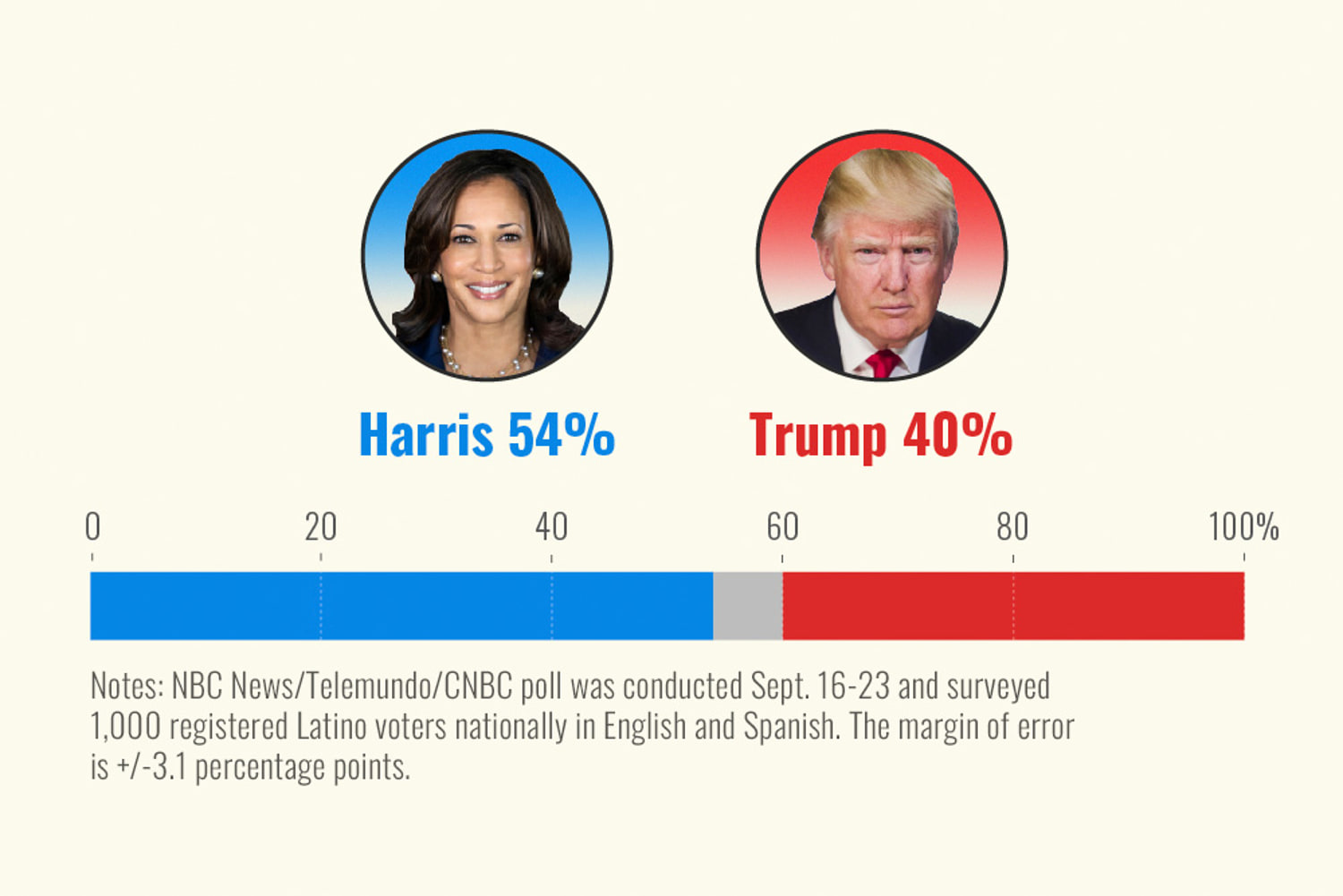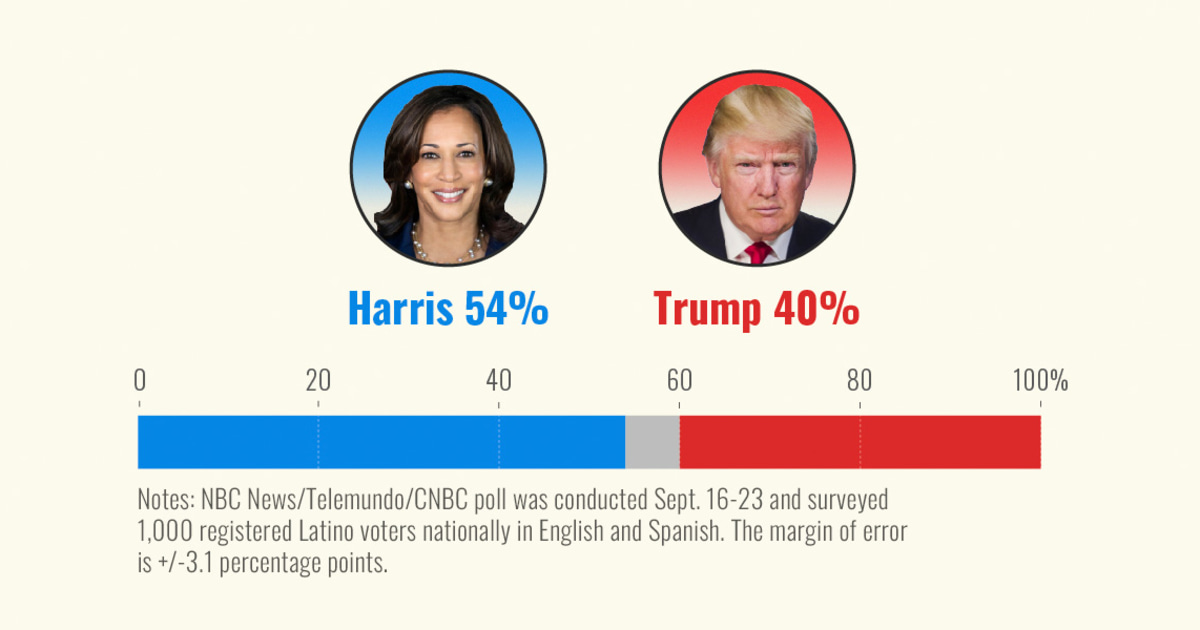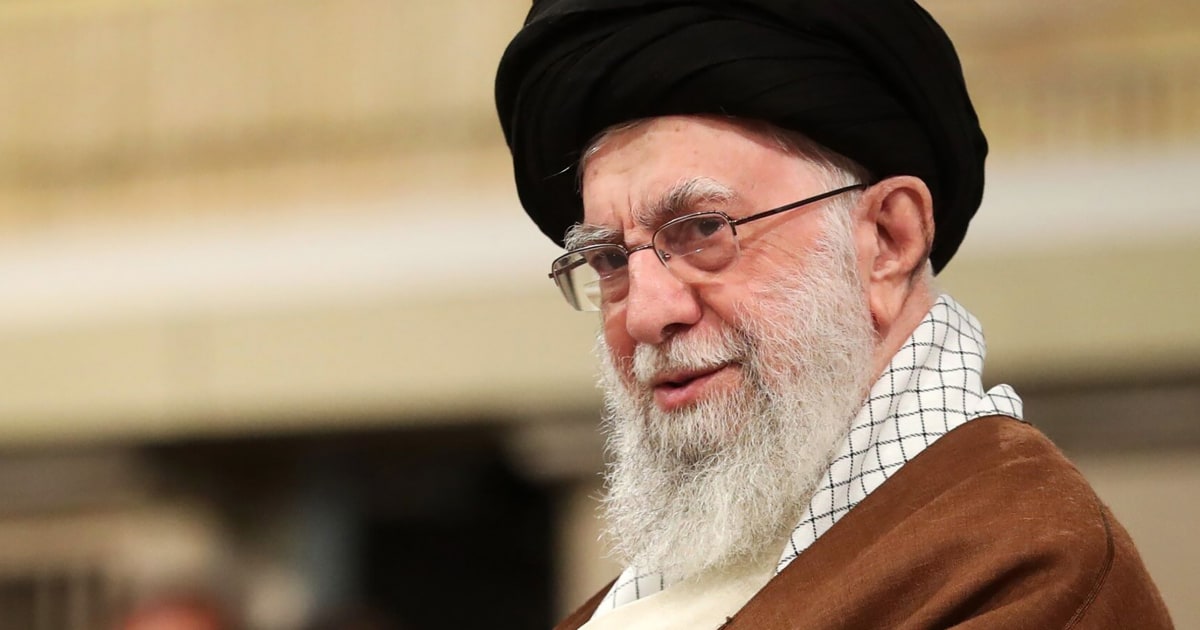
Vice President Kamala Harris is leading former President Donald Trump among Latino voters. But that advantage has declined to Democrats’ lowest level in the past four presidential cycles, according to a new national NBC News/Telemundo/CNBC poll.
Overall, the poll shows that Democratic presidential candidate Harris has lost some ground with Latinos at a time when these consequential voters are more likely than the general electorate to cite the economy and the rising cost of living as top priorities. On both of these issues, Latino voters give Trump the advantage, but a majority of them prefer Harris on temperament, competency and having the necessary mental and physical health to be president.
Support for Harris is at 54% among registered Latino voters, according to the poll, while Trump gets 40% and another 6% say they’re unsure or wouldn’t vote. The margin of error in the poll is plus or minus 3.1 percentage points.
While Harris’ 14-point advantage is an improvement from President Joe Biden’s standing when he was at the top of the ticket, it is still lower than the past leads Democratic presidential candidates enjoyed in 2012 (by 39 points), 2016 (50 points) and 2020 (36 points), according to NBC’s merged polling data from those past cycles.
(Ultimately, Democratic presidential candidates ended up winning Latino voters by 44 points in 2012, 38 points in 2016 and 33 points in 2020, according to the NBC News exit polls in those years.)
Similarly, Latino voters’ preference for which party controls Congress stands at 54% Democrats, 42% Republicans — a much narrower gap than in past years.
Driving the declining support for Democrats in the presidential contest are defections from Latino men, particularly those without college degrees and those under the age of 50, the poll shows. But solid Democratic support from Hispanic women, or Latinas, has helped offset some of that erosion.
Surveying 1,000 Latino voters nationwide in English and Spanish, the poll also finds a striking split on immigration between Latino voters who prioritize a pathway to citizenship for undocumented immigrants and preventing discrimination, and those who focus more on border enforcement.
The latest findings underscore the political diversity of Latinos, which mirror broader divisions seen across the general electorate.
“Latino voters are incredibly diverse. It can’t be overstressed,” said Democratic pollster Aileen Cardona-Arroyo of Hart Research Associates, who conducted the poll with Republican pollster Micah Roberts and his team at Public Opinion Strategies. “We are looking at Latino voters rather than a consolidated Latino community.”
Trump is ahead on the economy, but more Latinos see Harris as a better leader
The NBC News/Telemundo/CNBC poll asked Latino voters which presidential candidate is better on protecting immigrant rights, securing the border and fighting crime, as well as dealing with abortion issues, the economy and the rising cost of living.
Those surveyed give Harris the advantage on the issues of immigrant rights (a 39-point lead over Trump), abortion (+32) and crime (+5).
Trump receives the advantage on dealing with inflation and the cost of living (9-point lead over Harris) and the economy (+4 points), as well as securing and controlling the border (+13 points). A majority of Latinos in the poll — a combined 54% — say the cost of living and the economy are their top issues.
After watching the first presidential debate between Harris and Trump, Victor Gutierrez, 62, of New Jersey said he is “leaning toward Trump because I believe he has a better grasp on what to do as president” based on his stances on the economy and border security. For Gutierrez, who is Puerto Rican, Harris came off as too performative during the debate, which he said made him distrustful.
But according to the poll, when it comes to deciding who possesses the necessary leadership qualities and personal traits to be president, Latinos favor Harris over Trump in all of the seven categories surveyed — including having the right temperament to be president (+28 points), having the necessary mental and physical health (+25 points), being honest and trustworthy (+26 points) and representing change (+21 points).
Michelle García, 49, said she sees Harris as a leader who represents communities that have historically lacked a voice in government — such as women, people of color and immigrants.
García, who is of Peruvian and Puerto Rican descent, spent her Saturday knocking on doors in her community in Maryland to get people to vote for Harris. Some of the main issues driving García’s support for Harris are her outspokenness on fixing the economy by closing the nation’s growing wealth gap and the fact that Harris is unapologetically in favor of abortion rights, she said.
The poll also asks Latino voters which political party is better at addressing the Hispanic community’s concerns. By a 47%-20% margin, Latino voters prefer the Democratic Party — essentially unchanged from when the poll asked this same question in 2022.
But the Democratic advantage declines to 11 points, 39%-28%, when Latino voters are asked which party better shares their values — a drop from the Democrats’ 19-point edge here two years ago.
Latino support varies widely by gender and religion
In California, Hispanic voters Matthew Delao, 60, and Fredy Arguello, 50, have historically voted for both Democratic and Republican presidential candidates in previous elections. But this year, Delao has decided to vote for Trump, saying he realized he was better off economically during his presidency. Arguello is solidly supporting Harris, because he views her as having the necessary experience and character to lead the country.
“There’s no comparison. You’re talking about a former state attorney, someone who has served the public,” Arguello said about Harris, “versus someone like Trump, who has no moral standing.”
But Delao strongly believes Democrats are “just giving away so many things to people who shouldn’t need it,” he said, adding that it is important to him that whoever wins the White House “should concentrate on the United States, concentrate on your own people.”
Their divide is representative of how Harris and Trump are splitting the vote evenly among Latino men, with each getting 47% support, the poll shows, versus Harris’ 26-point lead among Latinas.
That’s a shift from NBC’s merged polling from 2020, when Biden held a 20-point lead over Trump among Latino men. Young Hispanic voters ages 18 to 34 have also moved, supporting Harris over Trump by 10 points (51%-41%), down from Biden’s 44-point lead in 2020 (66%-22%).
Among Latino men, Trump gets more support from men under 50 (they break for him over Harris, 51%-42%) and from those without college degrees (who prefer Trump, 51%-38%), according to this poll.
Meanwhile, Harris’ stronghold remains with Latinas over 50 (winning them 74%-22%) and Hispanic women with college degrees (61%-35%).
As a college graduate who worked through school and is also still paying off her student loans, García believes Harris is better equipped to understand “what it’s like to struggle.”
“That’s a humbling experience. That takes grit. And as a woman, that represents me,” said García.
Among religious Latinos, support is split, the poll shows.
Catholic Latinos back Harris over Trump by 20 points (56%-36%) while Trump leads among evangelical Latinos, 64%-28%. Nonreligious Latinos voiced support for Harris by more than 40 points (71%-24%).
A striking split on immigration
What also stands out in the poll are Latinos’ changing attitudes on immigration, as well as a stark divide on their immigration priorities.
Sixty-two percent of Latino voters believe immigration helps more than it hurts, versus 35% who think it hurts more than it helps. That 35% share saying immigration hurts more than it helps is the highest share of Latino voters coming down on that side in two decades of asking the question.
Additionally, when asked to pick their bigger priority, 52% of Latino voters said it was more important to prevent discrimination against immigrants and to create a pathway to citizenship, versus 46% who said it was more important to secure the border and stop immigrants from entering the country illegally.
Other findings
In the battle for control of Congress, Democrats hold a double-digit lead in congressional preference — but it’s down from past election cycles.
In this poll, 54% of Latino voters prefer a Democratic-controlled Congress, versus 42% who want Republicans in charge.
That 12-point lead represents a steady decline from September 2012 (when the Democrats’ advantage was 45 points), September 2016 (when it was 34 points), October 2020 (26 points) and September 2022 before that midterm election (21 points).
A demographic profile of Latino voters
- 52% say they primarily speak English, while the remainder either primarily speak Spanish or speak both languages.
- 56% trace their family’s heritage to Mexico; 16% to Puerto Rico; 11% to Spain; 5% to Cuba; 5% to the Dominican Republic.
- 49% identify as a Democrat, 37% Republican, 13% independent.
- 32% say they’re liberal, 37% are moderate, 29% are conservative.
- 49% are Catholic, 21% are Protestant, 28% described themselves as other/none.
The NBC News/Telemundo/CNBC Latino poll of 1,000 registered Latino voters was conducted Sept. 16-23. 53% of respondents were reached by cellphone; 10% were reached by landline; and 37% were reached text-to-web. Overall, 20% of the interviews were conducted in Spanish. The poll has a margin of error of plus or minus 3.1 percentage points.








